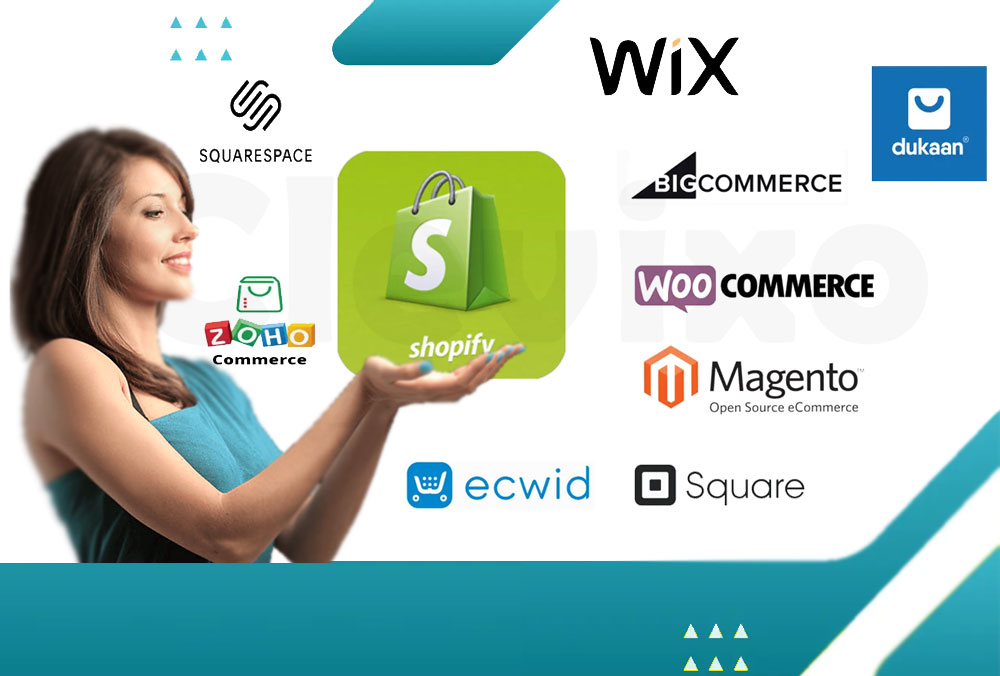

Why Shopify Stands Out Among Its Competitors: A Comprehensive Comparison
Launch Your Dream Online Store with Shopify Today!
Shopify is a leading e-commerce platform that powers over 4 million businesses globally. Its simplicity, scalability, and robust ecosystem make it a go-to choice for entrepreneurs. But how does it stack up against competitors like WooCommerce, BigCommerce, Wix, Magento, Squarespace, and others? Let’s delve into a detailed comparison of Shopify with its competitors to understand why Shopify is the platform to invest in.
Why Shopify Stands Out Among Its Competitors: A Comprehensive Comparison
Shopify is a leading e-commerce platform that powers over 4 million businesses globally. Its simplicity, scalability, and robust ecosystem make it a go-to choice for entrepreneurs. But how does it stack up against competitors like WooCommerce, BigCommerce, Wix, Magento, Squarespace, and others? Let’s delve into a detailed comparison of Shopify with its competitors to understand why Shopify is the platform to invest in.
1. Key Features Comparison
| Feature | Shopify | WooCommerce | BigCommerce | Wix | Magento (Adobe Commerce) | Squarespace |
|---|---|---|---|---|---|---|
| Ease of Use | Beginner-friendly, drag-and-drop builder | Requires WordPress knowledge | User-friendly but less intuitive than Shopify | Drag-and-drop; easy for beginners | Complex, developer-centric | Easy but limited e-commerce features |
| Customization | Highly customizable themes and apps | Extensive plugins, reliant on WordPress ecosystem | Limited design options | Basic customization | Full customization with coding | Limited e-commerce customization |
| Speed & Performance | Optimized for high-speed performance | Relies on hosting provider | Comparable to Shopify | Can slow down with heavy media | Performance depends on server setup | Adequate for small stores |
| App Ecosystem | 8000+ apps in the Shopify App Store | Limited to WordPress plugins | Fewer apps | Minimal app integrations | Expensive third-party apps | Limited plugins and extensions |
| Multi-Channel Selling | Sell on Amazon, eBay, Instagram, Facebook, etc. | Requires plugins | Available but not seamless | Limited | Complex setup | Basic multi-channel options |
| Payment Options | 100+ gateways, including Shopify Payments (0% transaction fee) | Relies on plugins | Fewer integrated gateways | Basic gateways | Fully customizable | Limited built-in gateways |
| Pricing | Starts at $29/month | Free (Hosting and plugins extra) | Starts at $29.95/month | Starts at $27/month | Free (Hosting costs $500+/month for Enterprise) | Starts at $16/month |
| Support | 24/7 live chat, email, and phone | Community-driven | 24/7 support | Email and limited phone support | Enterprise-grade support (expensive) | Limited chat/email support |
2. Why Shopify Outshines Competitors
A. Ease of Use
Shopify is designed for entrepreneurs with little or no technical skills. Its drag-and-drop builder, intuitive dashboard, and guided setup make it a breeze to use. In contrast, platforms like Magento and WooCommerce require technical expertise and regular maintenance.
B. Comprehensive Ecosystem
Shopify’s App Store offers over 8,000 apps, including marketing tools, inventory management systems, and advanced analytics. This ecosystem is unmatched by competitors like Squarespace and Wix, which have limited app integrations.
C. Multi-Channel Selling
With Shopify, you can manage sales across multiple platforms like Amazon, Instagram, and Facebook directly from your dashboard. This is more streamlined compared to WooCommerce and BigCommerce, which rely on third-party tools.
D. Security and Reliability
Shopify provides PCI DSS Level 1 compliance, ensuring your store is secure. WooCommerce and Magento, on the other hand, leave security to the hosting provider or developer, increasing risks for beginners.
E. Payment Gateways
Shopify Payments eliminates transaction fees, a feature absent in most competitors. While WooCommerce supports various gateways, transaction fees can add up.
3. Advanced Features Unique to Shopify
A. Shopify Plus
For enterprises, Shopify Plus offers tailored solutions for high-volume merchants. Features like custom checkouts, advanced APIs, and dedicated account managers make it a top choice for large businesses.
B. Shopify POS
Shopify’s Point of Sale (POS) system seamlessly integrates in-store and online sales, providing a unified inventory and customer experience.
C. Shopify Markets
Expand globally with Shopify Markets, enabling localized pricing, domains, and translations—features not easily replicated by competitors.
D. Headless Commerce
Shopify enables headless commerce, separating the backend and frontend for ultimate flexibility. Magento offers similar capabilities but requires significantly more effort and cost.
4. Cost-Effectiveness
While Shopify’s pricing starts at $29/month, it includes:
- Hosting
- SSL certificates
- 24/7 support
- Access to the Shopify App Store
In contrast:
- WooCommerce is free but incurs hosting, plugin, and maintenance costs.
- Magento requires expensive hosting and developer fees.
- BigCommerce has comparable pricing but fewer features.
Why Shopify Stands Out Among Its Competitors: A Comprehensive Comparison
Shopify is a leading e-commerce platform that powers over 4 million businesses globally. Its simplicity, scalability, and robust ecosystem make it a go-to choice for entrepreneurs. But how does it stack up against competitors like WooCommerce, BigCommerce, Wix, Magento, Squarespace, and others? Let’s delve into a detailed comparison of Shopify with its competitors to understand why Shopify is the platform to invest in.
1. Key Features Comparison
| Feature | Shopify | WooCommerce | BigCommerce | Wix | Magento (Adobe Commerce) | Squarespace |
|---|---|---|---|---|---|---|
| Ease of Use | Beginner-friendly, drag-and-drop builder | Requires WordPress knowledge | User-friendly but less intuitive than Shopify | Drag-and-drop; easy for beginners | Complex, developer-centric | Easy but limited e-commerce features |
| Customization | Highly customizable themes and apps | Extensive plugins, reliant on WordPress ecosystem | Limited design options | Basic customization | Full customization with coding | Limited e-commerce customization |
| Speed & Performance | Optimized for high-speed performance | Relies on hosting provider | Comparable to Shopify | Can slow down with heavy media | Performance depends on server setup | Adequate for small stores |
| App Ecosystem | 8000+ apps in the Shopify App Store | Limited to WordPress plugins | Fewer apps | Minimal app integrations | Expensive third-party apps | Limited plugins and extensions |
| Multi-Channel Selling | Sell on Amazon, eBay, Instagram, Facebook, etc. | Requires plugins | Available but not seamless | Limited | Complex setup | Basic multi-channel options |
| Payment Options | 100+ gateways, including Shopify Payments (0% transaction fee) | Relies on plugins | Fewer integrated gateways | Basic gateways | Fully customizable | Limited built-in gateways |
| Pricing | Starts at $29/month | Free (Hosting and plugins extra) | Starts at $29.95/month | Starts at $27/month | Free (Hosting costs $500+/month for Enterprise) | Starts at $16/month |
| Support | 24/7 live chat, email, and phone | Community-driven | 24/7 support | Email and limited phone support | Enterprise-grade support (expensive) | Limited chat/email support |
2. Why Shopify Outshines Competitors
A. Ease of Use
Shopify is designed for entrepreneurs with little or no technical skills. Its drag-and-drop builder, intuitive dashboard, and guided setup make it a breeze to use. In contrast, platforms like Magento and WooCommerce require technical expertise and regular maintenance.
B. Comprehensive Ecosystem
Shopify’s App Store offers over 8,000 apps, including marketing tools, inventory management systems, and advanced analytics. This ecosystem is unmatched by competitors like Squarespace and Wix, which have limited app integrations.
C. Multi-Channel Selling
With Shopify, you can manage sales across multiple platforms like Amazon, Instagram, and Facebook directly from your dashboard. This is more streamlined compared to WooCommerce and BigCommerce, which rely on third-party tools.
D. Security and Reliability
Shopify provides PCI DSS Level 1 compliance, ensuring your store is secure. WooCommerce and Magento, on the other hand, leave security to the hosting provider or developer, increasing risks for beginners.
E. Payment Gateways
Shopify Payments eliminates transaction fees, a feature absent in most competitors. While WooCommerce supports various gateways, transaction fees can add up.
3. Advanced Features Unique to Shopify
A. Shopify Plus
For enterprises, Shopify Plus offers tailored solutions for high-volume merchants. Features like custom checkouts, advanced APIs, and dedicated account managers make it a top choice for large businesses.
B. Shopify POS
Shopify’s Point of Sale (POS) system seamlessly integrates in-store and online sales, providing a unified inventory and customer experience.
C. Shopify Markets
Expand globally with Shopify Markets, enabling localized pricing, domains, and translations—features not easily replicated by competitors.
D. Headless Commerce
Shopify enables headless commerce, separating the backend and frontend for ultimate flexibility. Magento offers similar capabilities but requires significantly more effort and cost.
4. Cost-Effectiveness
While Shopify’s pricing starts at $29/month, it includes:
- Hosting
- SSL certificates
- 24/7 support
- Access to the Shopify App Store
In contrast:
- WooCommerce is free but incurs hosting, plugin, and maintenance costs.
- Magento requires expensive hosting and developer fees.
- BigCommerce has comparable pricing but fewer features.
5. Why Entrepreneurs Choose Shopify
- Rapid Deployment: Set up a store in hours, not days.
- Scalability: From small startups to enterprise solutions, Shopify grows with your business.
- Focus on Business: Let Shopify handle hosting, security, and updates while you focus on growth.
- Community and Support: A thriving community and 24/7 support ensure help is always available.
Conclusion: Shopify as a Strategic Investment
Shopify offers the perfect balance of ease, functionality, and scalability, making it a safe and profitable investment for entrepreneurs. Whether you’re launching a small boutique or scaling an enterprise, Shopify’s robust ecosystem and advanced features outpace competitors like WooCommerce, Magento, and BigCommerce.
With its focus on empowering businesses and streamlining operations, Shopify isn’t just an e-commerce platform; it’s a partner in your entrepreneurial journey.








